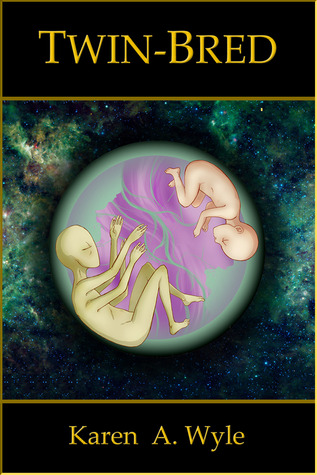Self-Publishing for the Rest of Us, by Karen Wyle
 Today I'm welcoming author Karen Wyle to my blog with a very timely post (for me anyway) about the reasons for choosing to self-publish. Karen's new Twin-Bred novel, Reach, has just been released and I thoroughly enjoyed the first novel in the series--Twin Bred; you can find my review here)--so I'm really looking forward to reading Reach. Meanwhile, here's Karen's post on the choices and commitments involved in self-publishing a novel--very relevant to me, as I said, since my beloved Divide by Zero may soon be seeking a new home...
Today I'm welcoming author Karen Wyle to my blog with a very timely post (for me anyway) about the reasons for choosing to self-publish. Karen's new Twin-Bred novel, Reach, has just been released and I thoroughly enjoyed the first novel in the series--Twin Bred; you can find my review here)--so I'm really looking forward to reading Reach. Meanwhile, here's Karen's post on the choices and commitments involved in self-publishing a novel--very relevant to me, as I said, since my beloved Divide by Zero may soon be seeking a new home...
Self-Publishing for the Rest of Us
There are authors
for whom the benefits of self-publishing are obvious and undeniable. Any
traditionally published author, moderately successful now or in recent memory,
whose backlist is unavailable should be doing anything feasible to obtain the
rights to those books. (S/he may already be contractually entitled to those
rights, as long as certain procedures are possible.) Even if it's necessary to
have a new cover made or to have the interior re-formatted, those one-time
expenditures are likely to pale in comparison to the revenue stream those books
could represent.
Even authors
whose books are all in print may want to take the occasion of their next
publishing or agency contract renewal to examine the fine print -- which is
likely to have changed considerably -- and to consider (possibly with the
assistance of an intellectual property attorney) whether the benefits of the
new contract outweigh the possible disadvantages.
But what about
the newcomers, the debut authors wondering whether to publish their own work or
to seek an agent and/or publisher?
There will always
be the stories of jaw-dropping success, self-published authors whose first (or
first publicized) book sells hundreds of thousands of copies. These authors
will have benefited from various kinds of luck, including the luck that the
stories they wanted to tell satisfied a need in the world of readers. (I doubt
that anyone attempting to assemble a novel according to the apparently popular
trends, without feeling the driving need to tell that sort of story, will
achieve such success.) I see no harm in dreaming of a mega-bestseller, or of
dreaming of winning the lottery -- as long as we treat such dreams as
irrelevant recreation.
For most of us,
self-publishing means a great deal of work for initially modest -- even minimal
-- sales. The income from our books may pay a bill here and there, but it won't
let us quit the day job. Strangers, even strangers carrying Kindles, will pass us
on the street, ignorant of our identities.
So what do we
gain?
We gain books.
During the time that our books would have been nothing but computer files or
piles of paper, they will be POD paperbacks and ebooks.
We gain readers.
When we would have been reading rejection letters or reports on where our books
had been submitted, we will be reading reviews.
We gain
experience. With our schedule under our own control, we may well be more likely
to write that next book, and the next, when we would otherwise have been
counting the slow months or years until our first book finally reached its
publication date. (We will, however, miss the experience of receiving and
responding to detailed editorial critiques, unless we make a point of hiring
editors to supply them.) While my first novel, Twin-Bred, has pleased a fair number of readers, I know that as I
prepare my third novel for release and edit my fourth, I have improved at my
craft. Had I stayed on the traditional publishing track, I might still be
awaiting Twin-Bred's publication. And
the experience I gained would not have included any serious involvement in my
own interior or cover design, let alone formatting for ebook and print. (I
would also have missed out on playing with CreateSpace's 3D simulation in its
digital proofer. I could twirl the book around for hours, kicking my heels and
giggling like a three-year-old.)
And what are our
prospects?
We will keep
learning.
We will keep
hearing from readers who have been entertained, or even moved, by the worlds and
characters we have created.
And as we write
and publish more books, we are likely to reach more readers, and earn enough to
pay a few more bills.
For me, it's more
than enough.
Want to find out more: Follow these links...
Author website: http://www.KarenAWyle.net
Facebook author page: http://www.facebook.com/KarenAWyle
Twitter handle: @WordsmithWyle
Blog, Looking Around: http://looking-around.blogspot.com
Twin-Bred on
Amazon (Kindle): http://amzn.to/u2OtVP
Twin-Bred on
Amazon (paperback): http://amzn.to/JYyGeG
Twin-Bred on
B&N online (paperback): http://bit.ly/xsyzwL
Wander Home on Amazon
(paperback): http://amzn.to/Z8fFj0
Wander Home on B&N
online (Nook): http://bit.ly/TymtxO
Wander Home on B&N
online (paperback): http://bit.ly/TkulFu
Smashwords (various ebook formats):
https://www.smashwords.com/books/view/239628
iTunes (Kindle): http://bit.ly/YgLOhT
iBookstore (paperback): http://www.ibookstore.com/products.php?i=148116709X
Kobobooks: http://bit.ly/WAMKRb
Reach's Smashwords page: https://www.smashwords.com/books/view/314247
Reach
on Goodreads: http://www.goodreads.com/book/show/17847283-reach
Amazon page:
Thank you so much for visiting my blog, and for your inspiring, helpful and thought-provoking post.

Comments